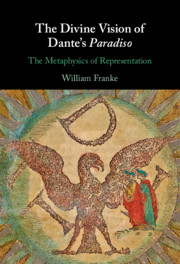Book contents
- The Divine Vision of Dante’s Paradiso
- The Divine Vision of Dante’s Paradiso
- Copyright page
- Contents
- Figures
- Prologue
- Acknowledgments
- Note on Translations and Primary Source Editions
- Part I The Literary Vision
- Chapter 1 Writing as Theophany: The Medium as Metaphor for Immediacy
- Chapter 2 The Presence of Speech in Writing: Speaking as Sparking
- Chapter 3 The Parts of Speech: Mediation and Contingency
- Chapter 4 From Speculative Grammar to Visual Spectacle and Beyond
- Chapter 5 Sense Made Sensuous and Synaesthesia in the Sight and Sound of Writing
- Chapter 6 Infinite Script: Endless Mediation as Metaphor for Divinity
- Part II Philosophical Reflections
- Appendix Paradiso XVIII. 70–136
- Index
Chapter 3 - The Parts of Speech: Mediation and Contingency
from Part I - The Literary Vision
Published online by Cambridge University Press: 26 August 2021
- The Divine Vision of Dante’s Paradiso
- The Divine Vision of Dante’s Paradiso
- Copyright page
- Contents
- Figures
- Prologue
- Acknowledgments
- Note on Translations and Primary Source Editions
- Part I The Literary Vision
- Chapter 1 Writing as Theophany: The Medium as Metaphor for Immediacy
- Chapter 2 The Presence of Speech in Writing: Speaking as Sparking
- Chapter 3 The Parts of Speech: Mediation and Contingency
- Chapter 4 From Speculative Grammar to Visual Spectacle and Beyond
- Chapter 5 Sense Made Sensuous and Synaesthesia in the Sight and Sound of Writing
- Chapter 6 Infinite Script: Endless Mediation as Metaphor for Divinity
- Part II Philosophical Reflections
- Appendix Paradiso XVIII. 70–136
- Index
Summary
The immediate presence of the medium of writing, taken as object of Dante’s vision, becomes a metaphor for the immediacy of vision in the visio Dei. Writing is a medium or a means, but it is made here to function also as an immediate revelation, of God – or at least as a symbol for such immediacy. And yet, Dante’s vision of the divine Word as writing breaks it down into signifying by virtue of difference. The positive presence of the divine is rather signified by a negative play of difference generated by the signifiers of writing. Writing, consisting of signifiers of absent signifieds, indicates how all sense in language is generated by difference without positive terms. Dante’s presentation of the written text of Wisdom from Scripture makes this generation conspicuous in its binary differentiations between noun and verb, vowel and consonant, gold and silver, etc. By highlighting the nature of writing as signifying by difference Dante reveals language as profoundly and metaphysically a way of alluding to the unrepresentable. Writing is subject to fragmentation and breaking down in every visible manifestation. This disintegration becomes itself the token of a higher meaning and being beyond its grasp. All its expressions and transmissions fall victim to radical contingency. The breakdown of mediation is the realization of Dante’s vision as the immediacy which is God. Anguished lest contingency undermine belief in divine providence, Dante turns contingency into the marker of a higher, humanly incalculable, urepresentable yet necessary Being and meaning. Such Being and meaning alone can be believed to be divine.
Keywords
- Type
- Chapter
- Information
- The Divine Vision of Dante's ParadisoThe Metaphysics of Representation, pp. 87 - 107Publisher: Cambridge University PressPrint publication year: 2021

